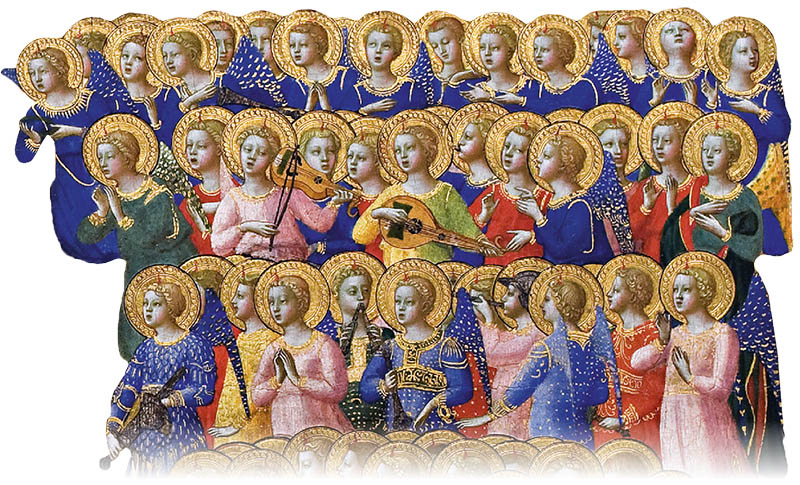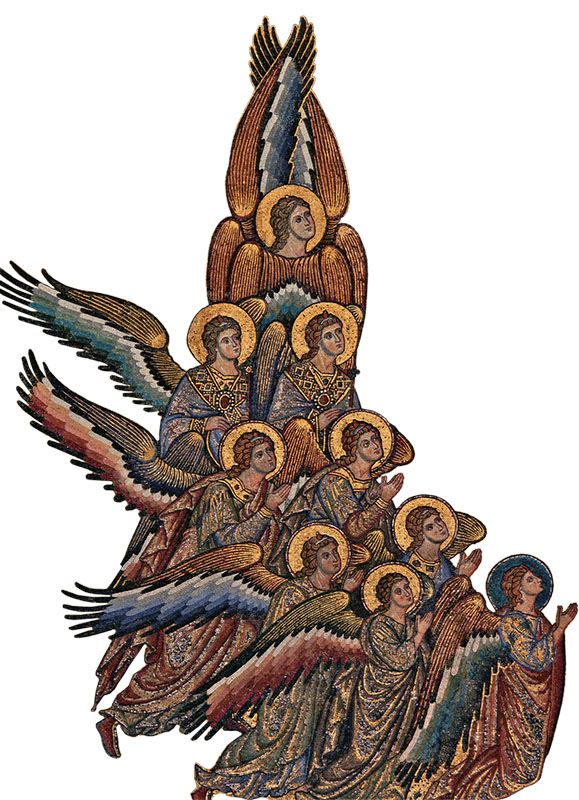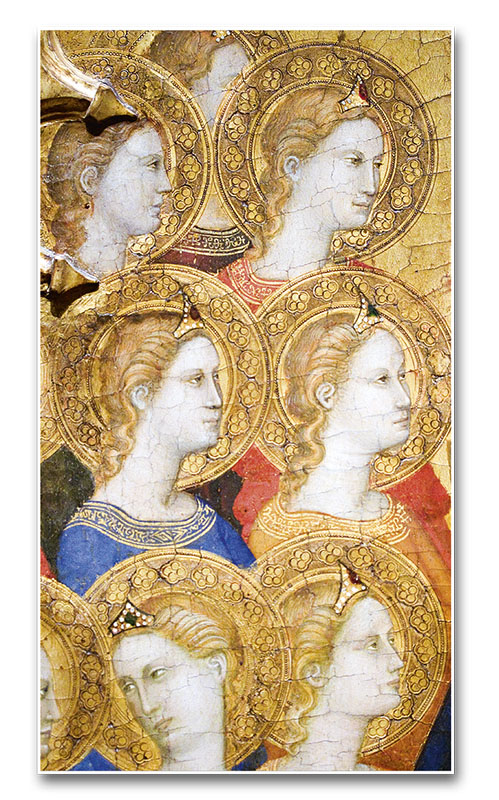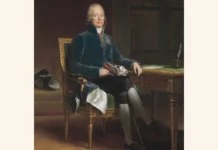Being pure spirits, angels are not able to speak as we do, through sounds and gestures. How, then, do they communicate among themselves and with God?
Discussing angels seemed extravagant and puerile until just a few years ago. However, the topic is back in full force in an era of widespread materialism.
Along with the renewed interest in angelic creatures, many fantasies and errors have been added to what the Church teaches about them. We do not intend to analyse these here. Rather, we propose an intriguing topic for exploration, hoping to at least partially draw aside the veil that hides the world of pure spirits: how do they communicate?
Composite yet immaterial beings
That angels are immaterial beings is naturally accepted today, although this is not easy to grasp. We tend to “anthropomorphise” angelic life, transposing the circumstances of our earthly existence to the celestial plane, when nothing could be further from reality.
For this very reason, during the first centuries of the Church, the debate on the possibility of “angelic bodies” sparked controversy among experts, and even saints. A prominent theological current—including St. Bonaventure—defended the theory that angelic beings have, in their composition, a sort of “spiritual matter”; an ethereal and extremely subtle body. How else, proponents argued, could their individuality and their contingency be explained, as well as the fact that they are composite and limited creatures?1 Moreover if angels are pure spirits, would they not be completely simple? 2 How, then, would they be distinguished from God?

The question was explained by one of the greatest intellectual luminaries—St. Thomas Aquinas. With simplicity and precision, he clarified the obscure ideas and the sometimes infantile ambiguities of the times.
We note in passing that St. Thomas is appropriately named the Angelic Doctor, a title used for the first time by St. Anthony of Florence (1389-1459)3 and later consecrated by St. Pius V in the Bull Mirabilis Deus, of 1567, “perhaps because of his virtues and, in particular, the sublimity of his thought and the purity of his life,” as Pope Benedict XVI notes.4
In the Summa Theologica, St. Thomas dedicates an entire treatise to angels, also treating of them in De Substantiis Separatis, in the Second Book of Sentences and in De Veritate, in addition to insightful commentaries in several other works.
Firstly, he disagreed with the need for an angelic body, pointing out the concept of “spiritual matter” as being, in itself, contradictory and unsustainable. This affirmation was one of the most controversial of his time and almost prompted the Bishop of Paris, Étienne Tempier, to condemn him as a heretic.
On the other hand, he upheld that all created beings are necessarily contingent and composite.
In the case of corporeal beings, there is a composition of matter and form. Yet, there is also a previous composition, inherent to every creature; that of essence and act of being (or existence). They are to one another in a relationship of potentiality and act.5 Thus, although there is no material in angels, they are composite: their essence is truly distinguished from their act of being.
God, however, is pure act; in Him, essence and existence are identical. As Fr. Gonzáles Bandera explains, He “is absolutely simple, and in Him there is no type of composition. Creatures can never attain the simplicity proper to God and, consequently, this implies some form of composition. However, it is not necessary to have recourse to matter to explain this composition; the original composition, inherent to the creature as such, is that of essence and existence.”6
The angels have being by participation in the divine Being. They did not always exist, but rather received the gift of existence at a fixed moment, and were created from nothing. This in itself, according to the innovative doctrine of St. Thomas, is sufficient to distinguish the creature from the Creator.7
Thus, the problem regarding angelic nature was resolved by St. Thomas: a creature, as perfect as it may be, is composed of at least essence and existence; in the Creator, existence and essence are one and the same.

How do the angels acquire knowledge?
Scholasticism teaches that we acquire knowledge through our senses. Thus, before our intellect forms an idea about an object, the internal senses—common sense, imagination, memory and cogitative—intervene, organizing and preparing the raw data perceived by the external senses, in imaginary representations. Finally, the intellect abstracts the individual characteristics from the particular object, capturing its essence, with which it will work to reach concepts, deductions and universal judgements.
Therefore, in the process of human knowledge, there is a passage from the particular object grasped, to corresponding universal ideas. Thus, if a person walking down a street were to suddenly encounter an animal, even without knowing any details about it (when it was born, for instance, or who its owner is) he would know whether it was a dog or a cat, for example.
After we have encountered several dogs, the canine essence is well established in our mind by certain characteristics which, being universal, apply to all the entities of that species. Thus, barring interference (for example, a lack of proper local lighting), seeing a dog, we know that it is a dog, whether it is a Dalmatian, German Shepherd, Labrador, or mongrel, and regardless of its size, colour or other individual features.
Our reason, then, works with universal ideas. Therefore, we fully understand a notice that reads: “The State Health Commission requires that all dogs be vaccinated against rabies.” “Dogs” refers to the essence, and therefore designates all individuals of the canine species.
However, with the angel, the process of knowledge cannot occur in the same manner, since angels do not have bodies, and therefore do not possess senses that capture particulars.
How, then, does the angel acquire knowledge of things?
Summarizing the doctrine of St. Thomas in this regard, Professor Peter Kreeft affirms that “it is proper to man to progress to truth in stages, through conceiving and reasoning to the knowledge of the truth of a judgment;” while the angels know “intuitively and immediately, at once, not through this temporal process.”8
Let us examine these points in further detail.
The species (in logic: intellectual images, or ideas) by which angels know things do not come from the things themselves. Thus, for example, an angel does not need to know several cats, abstracting the particular characteristics of each one, to arrive at the idea of “cat”. Angelic spirits are not subject to a gradual development, but rather began to exist in the fullness of their knowledge. They do not need to learn, in the strict sense of the word.
In other terms, at the moment in which God created the angels, He infused them with ideas or abstract concepts of all things, without which they would be unable to know particular or individual things. When an angel “sees”—which is to say, applies his intelligence to something new, he does not acquire an idea, but rather confers with the universal concept already present in his intellect.

Pyramidal and vertical hierarchy
There is a hierarchy among men that we could call pyramidal, in that many depend on one or a few. This occurs in families, in which the children are subject to parents; or in a country, where subjects depend on the monarch or Head of State. In family hierarchy, children share relative equality, not depending on one another to present desires and questions to the parents. Evidently, absolute equality is not tenable, as one child will be more intelligent or stronger—and in that aspect, superior—to the others. At a higher level, such inequality is what makes the constitution of a society possible.
This takes place differently among the angels. With them, each one constitutes a unique species, and the higher the rank of the angel, the richer are the ideas or concepts that were infused into him by God, in creating him.9
We might imagine that this inequality is a reason for sadness for the inferior angels. Yet, this is not so, since the desires, capacities and glory of each are fully satisfied by the Creator Himself, from the moment in which they entered Beatific Vision.10 Therefore, it is not possible for them to feel unhappiness. On the contrary, the qualities of the superior angels constitute a source of admiration.
How do angels speak?
With these clarifications in place, we can now ask how angels “speak”, and it is once again St. Thomas who provides the answer: through enlightenment and speech.
Enlightenment is the act by which a superior angel instructs an inferior angel regarding some supernatural truth of which he has knowledge, due to a direct revelation from God. For example, God expressly revealed the future Incarnation of the Word to all angelic beings, but not all in the same way: to some He communicated more, to others less, leaving the superior angels the task of enlightening their inferiors, so that the latter would progress in the knowledge of this mystery until the day of its fulfillment.11
According to St. Thomas, enlightenment takes place in the following manner: in the first place, the superior angel strengthens the inferior angel’s capacity to understand; secondly, the superior proposes to the inferior, particular aspects of supernatural truths that he, the superior angel, “conceives universally.”12
St. Thomas illustrates this doctrine by using the example of a teacher, who, to teach a subject, divides it into coherent and ordered parts, conforming it to the capacity of the students. Evidently, the latter will have a fragmented understanding, inferior to that of the professor. The same happens with angels: “The superior angel receives the knowledge of truth by a kind of universal conception, to receive which the inferior angel’s intellect is not sufficiently powerful.”13 The superior angel fragments and multiplies the truth that he himself conceives universally, making it more particular, to enlighten the inferior angel.
This form of communication, by enlightenment, only proceeds from superior to inferior angels. Yet, in speech, the inferior angels also speak to the superior angels. According to the Angelic Doctor, the goal of speech is to manifest something interior to the one with whom one speaks, or to ask something: “To speak to another only means to make known the mental concept to another.”14 This is not a matter of presenting a supernatural truth, in which there is enlightenment. In other words, all enlightenment is speech, but not all speech is enlightenment.

National Gallery of Art, Washington, D.C.
Evidently, communication between angels is not expressed with sounds, gestures or other material elements, since their nature is solely spiritual. Communication is achieved by an act of the will, by which an angel directs a thought to others, giving them to understand concepts he already possesses. He can even communicate something to some and not others, as he wishes.
The angels also communicate with God, but never as the agent directs himself to the patient, or, according to human terminology, the master to the disciple. “An angel speaks to God—St. Thomas explains—either by consulting the Divine will of what ought to be done, or by admiring the Divine excellence which he can never comprehend.”15
The theme of angelic conversations
It is evident that the principal object of angelic conversation is God, since all creatures naturally turn to the Creator, especially such perfect beings as angels.16 Furthermore, being in the Beatific Vision, they will be eternally contemplating new aspects of God. Since God is infinite, as much as the angels of Heaven see Him in His entirety, they do not see Him entirely, since this is not possible for any creature.
They also converse with regard to the divine plans for the material universe, of which man is the most important element. Therefore, they cannot help but have great interest in the divine action in history; thus, the superior angels communicate to the inferiors what they “see” in God in this respect.
We can imagine a dialogue in which our guardian angel asks a higher-ranking angel how to better understand our psychology. Why did we act in a certain way, for example, or why did we not react on another occasion. Besides giving the guardian angel explanations, the superior angel also adds instructions on how to guide our soul in a manner most suited to the plan of God.
One thing is certain: our guardian angels are continually conversing about us with the angels superior to them, so that there is a “cascade”, or “chain”, of angels concerned with the sanctification of each one of us.
May such a thought serve to increase our devotion to the holy angels—glorious heavenly intercessors whom we so often forget! ◊
Notes
1 BANDERA GONZÁLEZ, Armando. Introduction to questions 50 to 64. In: Summa Theologica. 4.ed. Madrid: BAC Maior, 2001, p.496.
2 Regarding the divine simplicity, let us recall that on the spiritual plane, contrary to what happens in the material plane, the simpler something is the more perfect it is. Cf. CREAN, Thomas. A Catholic replies to professor Dawkins. Oxford: Family Publications, 2008, p.29-32.
3 CLÉMENT, André. La sagesse de Thomas d’Aquin. Paris: Nouvelles Editions Latines, 1983, p.171-173.
4 General Audience, 2/6/2010. Various authors point out that this title is due to the acuity of his thought, as if angelic. CLÉMENT, op. cit., p.171; HEUSER, Herman Joseph. In: The American ecclesiastical review. 1923, v.LXVIII, p.92: “Even more so because of his extraordinary intellectual power, which permitted him to speak with the language of the angels.”
5 ST. THOMAS AQUINAS. Summa Theologica, I, q. 50, a. 2, ad 3.
6 BANDERA, op. cit., p.496.
7 Idem, ibidem.
8 KREEFT, Peter. Summa of the Summa. San Francisco: Ignatius, 1990, p.328.
9 ST. THOMAS AQUINAS, op. cit., q. 106, a 4, ad 1.
10 Everything that has been mentioned with regard to the angelic nature applies, evidently, both to the angels of Heaven, confirmed in grace, as well as the fallen angels. Contrary to the latter, it is clear that the holy angels, even when in a state of trial, never gave way to movements of envy, whether in relation to God or the other angels.
11 JOSEPH MACINTYRE, Archibald. Os Anjos, uma realidade admirável. Rio de Janeiro: Revista Continente, 1983, p.255.
12 ST. THOMAS AQUINAS, op. cit., I, q. 106, a. 1.
13 Idem, ibidem.
14 Idem, I, q. 107, a. 1.
15 Idem, I, q. 107, a. 3.
16 It is evident that the holy angels speak about God enraptured with love, admiration and the desire to grow in the knowledge of Him and to serve Him, while the devils are moved by hatred and revolt: their non serviam echoes for all eternity.







